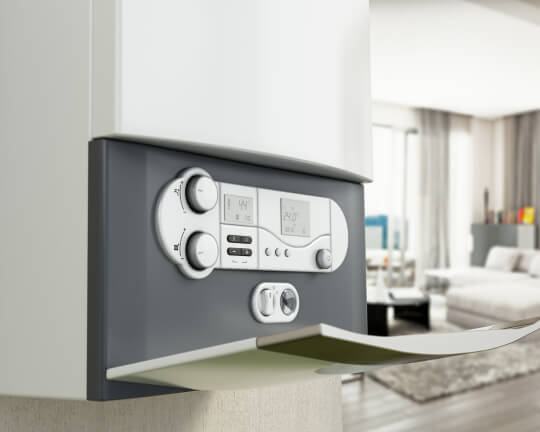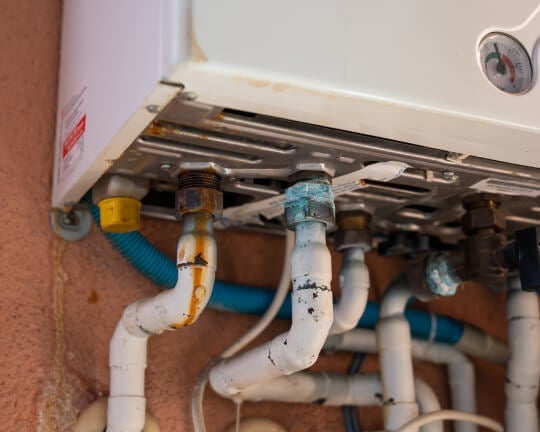New boiler guides
5 signs you need a new boiler replacement
23 Apr 2024 • 6 minutes


If you’ve had your boiler for a while then it’s worth looking out for signs that you might need a new boiler; such as funny noises, low efficiency and regular breakdowns.

A new boiler is a big investment, so you’d expect it to last a long time. The average lifespan is usually around 10 to 15 years, but that depends on a few different factors, such as the brand of boiler you have, its service history and how often it’s used.
To make sure you’re in tune with your boiler as it gets older, we’ve listed some of the most common problems below, so when you start thinking, should I repair or replace my boiler, you’ll have a better idea of what the answer should be.
The only time your boiler should make any noise is when it’s firing up. When running, there’ll be a low, constant hum that you probably don’t even notice – that’s exactly how it should be.
Anything that resembles banging, gurgling, clunking or whirring could signal a problem, so make sure you switch your boiler off, to help stop any further damage, and get an expert to check it over as soon as you can.
Sometimes, minor issues could be the cause and these are generally easy to fix. For example, if there’s a build up of dirt and debris, a powerflush to clean the system can help solve the problem. If you fancy doing some investigating of your own, our simple step-by-step guide to fixing noisy boilers will help you get to the bottom of things.
As your boiler gets older, a common issue you might notice is it stops heating your home or water as well as it used to. Simply put, the older your boiler gets, the less energy efficient it becomes. So you’re still paying the same to run it, but not getting as good an output.
Did you know that replacing an old G-rated boiler with a new A-rated boiler could save you up to £540 a year on your energy bills*? If you’d like to learn more, take a look at our guide to increasing boiler efficiency.
Make sure you continue getting your boiler serviced annually and don’t forget to bleed your radiators regularly, to remove any trapped air that could lead to corrosion within your system. You might find this gives your boiler a new lease of life – for a little while, at least!
If you’ve got a leaking boiler then it’s a sure sign that an internal component is broken. It’s usually a seal or valve, but sometimes it could be something more serious, like the corrosion of the heat exchanger. Why not check out why is my boiler leaking guide to help you find out what’s causing it?
Whatever the outcome, your boiler should never leak water, so make sure you should turn your boiler off, clear up the water and call in an expert to get it fixed before it leads to something more serious. If it’s left it could cause even more damage to internal components, or potential structural damage to your property.
If you’ve got a boiler that breaks down a lot, you’ll soon start to find that it’s less cost effective to keep repairing it. In the long run you’d be better off investing your money in a new, more reliable one. Older boilers often break down regularly due to the need for replacement parts, but over time parts can become less available, making it even harder and more expensive to keep repairing your boiler when something goes wrong.
A healthy boiler will never give off any bad smells, so if you notice that yours has an odd odour, then get in touch with a Gas Safe registered engineer as soon as possible. We’ve got experts on hand nearby, who can look at the problem for you.
However, if the smell is sulphurous or eggy, and stronger when your boiler is in use, this could mean you have an escape of gas or fumes. In this case, you should turn the boiler off straight away, open any windows, and evacuate to a safe location outside the home. Then call the emergency gas line on 0800 111 999.
It’s always a good idea to have an audible carbon monoxide (CO) detector in the vicinity of your boiler, usually in the kitchen. CO detectors should have a CE mark, proving they have met EU safety requirements, and be approved to British Standard EN 50291. CO detectors should be tested regularly by pressing the test button to ensure it’s operating correctly.
This is one of the most frequently asked questions, so we’ve pulled together a few of the key things you should consider, to help you make the right decision for you and your wallet.
The cost of a new boiler varies depending on a few different things. The type and size of boiler you chose, the installation work needed – the size, age and location of the boiler being replaced, as well as the system you’re upgrading to and whether any additional parts are needed.
Don’t forget to consider the installation fees too – this isn’t a DIY job, so you’ll need to get a Gas Safe registered engineer in to do it for you.
If your boiler is on the blink and you’re not sure where to start your search for a new one, BOXT are here to help.
We’re working together with BOXT, one of the largest boiler installation companies in the UK, to help you find the best boiler for your home.
BOXT makes choosing the perfect new boiler for your home easy with a fixed price quote on your screen in just 90 seconds.
If you’ve had your boiler for a long time, or it starts acting strange – making noises, giving off bad smells, starts leaking or constantly breaking down, then it sounds like it might be time to start looking for a new one.
The average lifespan of a boiler is usually around 10 to 15 years, but that depends on a few different factors, such as the brand of boiler you have, its service history and how often it’s used.
A new boiler is a big investment, but if you’re constantly paying out to get it fixed, then you could be better off in the long run, by getting a new one. Always make sure your finances stack up before you commit to anything and don’t forget, payment options are usually available to help you spread the cost.
Is your boiler over 10 years old? Has it been causing you endless problems that leave you out of pocket? If the answer is yes then it sounds like it’s time to start thinking about upgrading your boiler to something more reliable and energy efficient.
Our help & advice articles cover Plumbing, Home heating, Electrical, Energy-saving and Home maintenance.